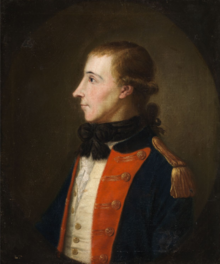
Back وولف تون Arabic وولف تون ARZ Theobald Wolfe Tone AST Theobald Wolfe Tone Catalan Wolfe Tone Czech Theobald Wolfe Tone CY Theobald Wolfe Tone German Theobald Wolfe Tone Spanish Theobald Wolfe Tone EU Wolfe Tone Finnish
Wolfe Tone | |
|---|---|
 Portrait in the National Gallery of Ireland, Dublin | |
| Born | Theobald Wolfe Tone 20 June 1763 |
| Died | 19 November 1798 (aged 35) Dublin, Kingdom of Ireland |
| Burial place | Bodenstown Graveyard, Sallins, County Kildare, Republic of Ireland |
| Education | |
| Agent(s) | Society of United Irishmen, Catholic Committee and Convention |
| Spouse | |
| Military career | |
| Allegiance | United Irishmen French Republic |
| Battles / wars | Battle of Tory Island |
| Part of a series on |
| Irish republicanism |
|---|
 |
Theobald Wolfe Tone, posthumously known as Wolfe Tone (Irish: Bhulbh Teón;[1] 20 June 1763 – 19 November 1798), was a revolutionary exponent of Irish independence and is an iconic figure in Irish republicanism. Convinced that so long as his fellow Protestants feared to make common cause with the Catholic majority, the British Crown would continue to govern Ireland in the interest of England and of its client aristocracy, in 1791 Tone helped form the Society of United Irishmen. Although received in the company of a Catholic delegation by the King and his ministers in London, Tone, with other United Irish leaders, despaired of constitutional reform. Fuelled by the popular grievances of rents, tithes and taxes, and driven by martial-law repression, the society developed as an insurrectionary movement. When, in the early summer of 1798, it broke into open rebellion, Tone was in exile soliciting assistance from the French Republic. In October 1798, on his second attempt to land in Ireland with French troops and supplies, he was taken prisoner. Sentenced to be hanged, he died from a reportedly self-inflicted wound.
Since the mid-nineteenth century, his name has been invoked, and his legacy disputed, by different factions of Irish Republicanism. These have held annual, but separate, commemorations at his graveside in Bodenstown, County Kildare.
- ^ "Cartlann Téacsanna". corpas.ria.ie. Archived from the original on 9 July 2021. Retrieved 9 July 2021.